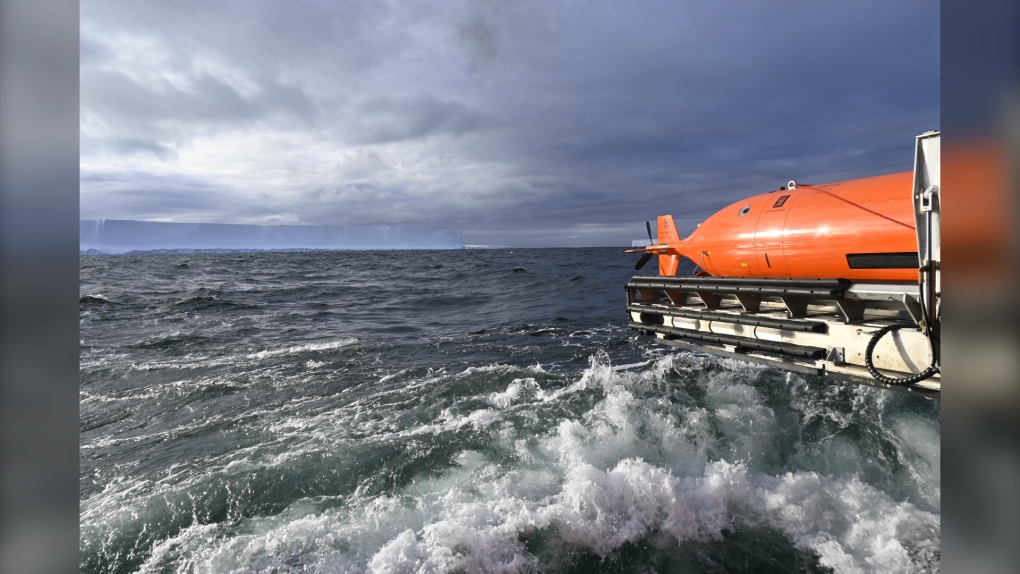'Incredible data': Manitoba researcher part of Antarctic ice shelf studies
A University of Manitoba scientist got a view of Antarctica not everyone has seen in an effort to study how rising sea levels are impacting the continent's ice shelves.
Glaciologist Karen Alley, an assistant professor at the University of Manitoba, is part of an international research team examining a massive ice shelf in west Antarctica, capturing new 3D images to examine the changes.
"We're interested in understanding how the Antarctic ice sheet is changing," Alley said. "The world sea levels are rising, they will continue to rise in the future, and we're trying to understand how quickly that sea-level rise is going to happen and how much sea-level rise we're going to get, and a big part of that is understanding these floating ice shelves."
The team, led by Anna Wåhlin from the University of Gothenburg, sent an automated underwater vehicle named Ran underneath the ice shelf to capture images in 2022. A multi-beam imager was used to bounce sound waves off the ice and create 3D images.
 Ran, an automated under water vehicle, prepares to travel underwater to map an Antarctic ice shelf. (Anna Wåhlin/University of Gothenburg)
Ran, an automated under water vehicle, prepares to travel underwater to map an Antarctic ice shelf. (Anna Wåhlin/University of Gothenburg)
The work was recently published in Science Advances.
"Ran worked for many years and brought back incredible data that's really changed the way we understand a lot of the polar systems," Alley said.
She said the data showed the melt processes are changing Antarctica's ice shelves.
"What this tells us is that the models we use to predict how much ice shelves are going to melt in the future aren't doing a good job capturing how complex this is," Alley said. "Hopefully, now that we understand better just how much variability there is in the melt, we can do a better job incorporating that into our models and do a better job predicting future sea level rise."
This year, Ran was sent down underwater for additional research and got some new data to show how things have changed. However, it didn't return to their ship on the final mission.
"Ran is somewhere underneath Dotson Ice Shelf," Alley said. "That's where he'll remain in the future. Maybe there was some equipment malfunction, maybe a curious seal swam around it and confused its navigation, we won't ever know."
Alley said they are hoping to replace Ran in the future and return to Antarctica for more research.
-With files from CTV's Katherine Dow.
CTVNews.ca Top Stories

Joe Biden pardons his son Hunter Biden on gun, tax charges, despite previous promises he wouldn't
U.S. President Joe Biden announced Sunday that he pardoned his son Hunter Biden on gun, tax charges, despite previous promises that he would not do so.
Canada Post presents union with 'framework' to reach deal as strike continues
Canada Post has presented the union representing some 55,000 striking postal workers with a framework to reach negotiated agreements, the corporation said.
'Devastating': Missing Surrey, B.C. teen found dead, family says
The family of a missing 18-year-old, who was last seen in Surrey over a month ago, says there has been a tragic end to the search.
The best tips to prepare your car for the winter
Slippery or snow-covered roads, reduced visibility and bitter cold are all conditions that can make driving difficult and even dangerous during cold weather months. CAA spoke with CTV Morning Live this week on some of the best ways you can winterize your car.
PM Trudeau 'surprised' provinces unanimous on accelerated defence spending: Ford
Ontario Premier Doug Ford says his fellow provincial leaders are united in pushing for Canada to meet its NATO defence spending targets ahead of schedule, and that Prime Minister Justin Trudeau was "surprised" to hear it.
Stellantis CEO resigns as carmaker sales continue to slump
Stellantis CEO Carlos Tavares is stepping down after nearly four years in the top spot of the automaker, which owns car brands like Jeep, Citroën and Ram, amid an ongoing struggle with slumping sales.
'Wicked' star Marissa Bode speaks out against 'harmful' ableist comments made about her character
'Wicked' actress Marissa Bode posted a video on TikTok asking for kindness after receiving ableist comments on social media.
Poilievre calls for asylum seeker cap, border plan as U.S. tariff threat looms
Conservative Leader Pierre Poilievre has demanded the federal government present a plan before Parliament to beef up border security as U.S. president-elect Donald Trump threatens to impose stiff tariffs on Canada.
Emergency crews battle large fire at Kitchener, Ont. townhouse complex
Waterloo Regional Police say Kingsway Drive will remain closed as emergency crews continue to battle a large blaze at a townhouse complex.


































